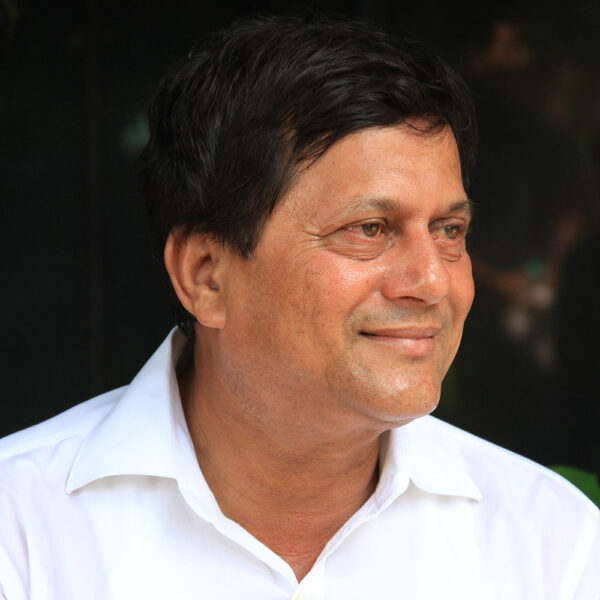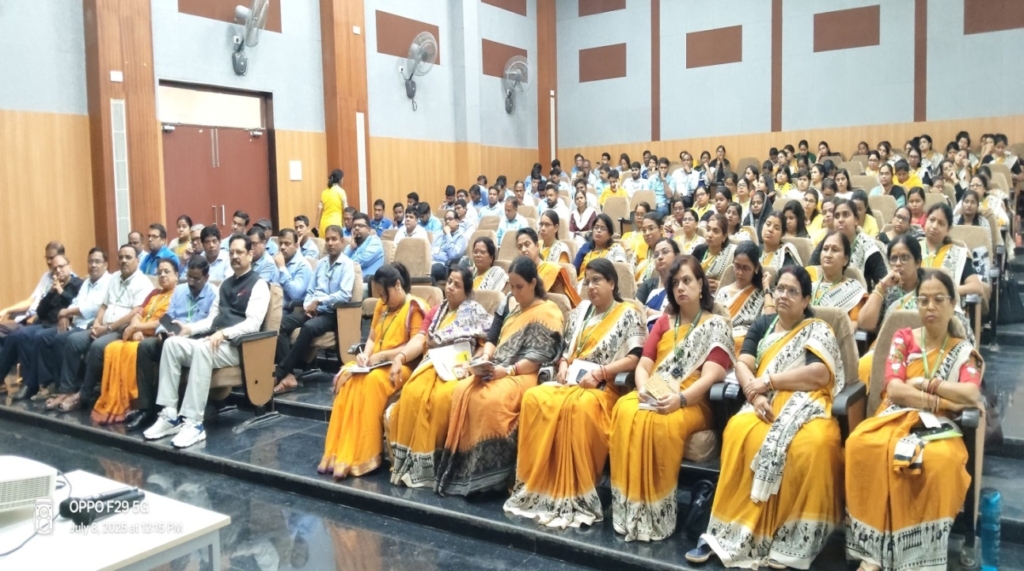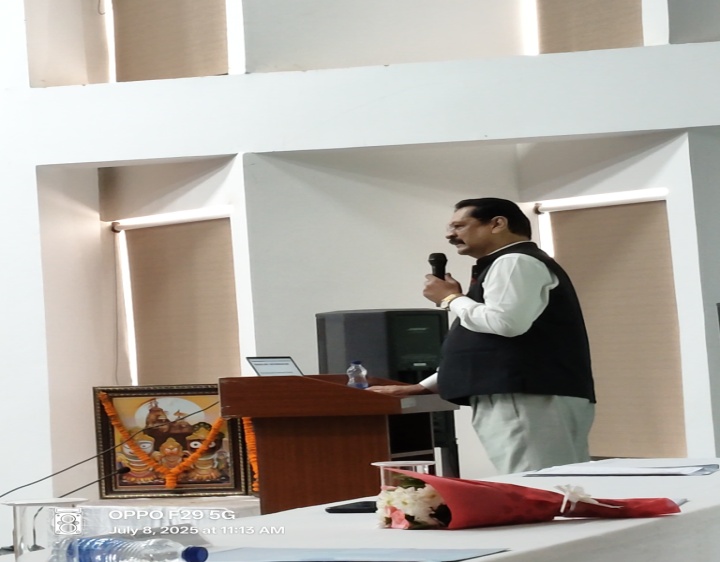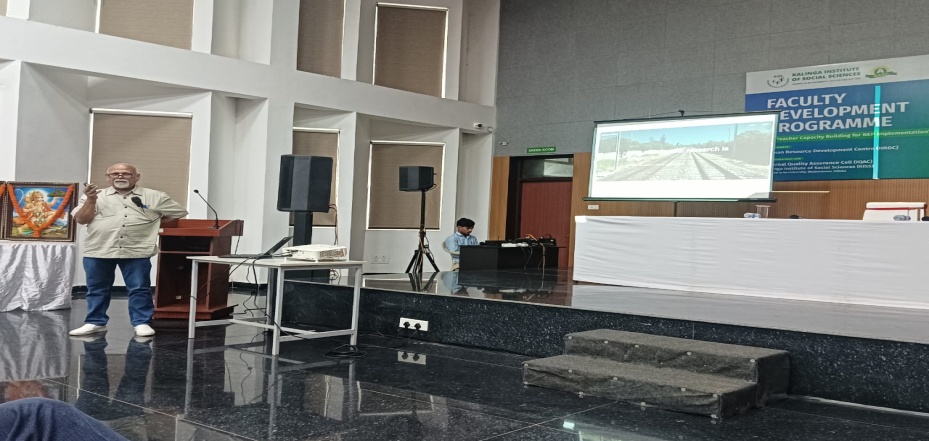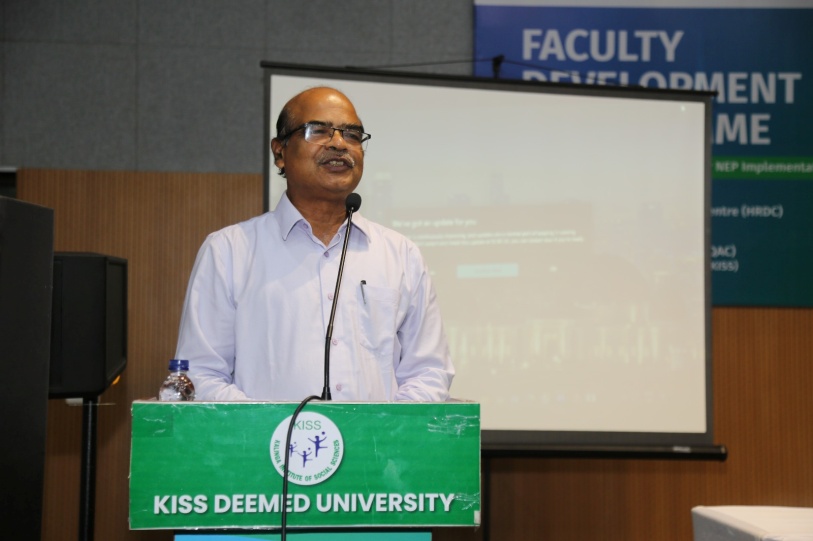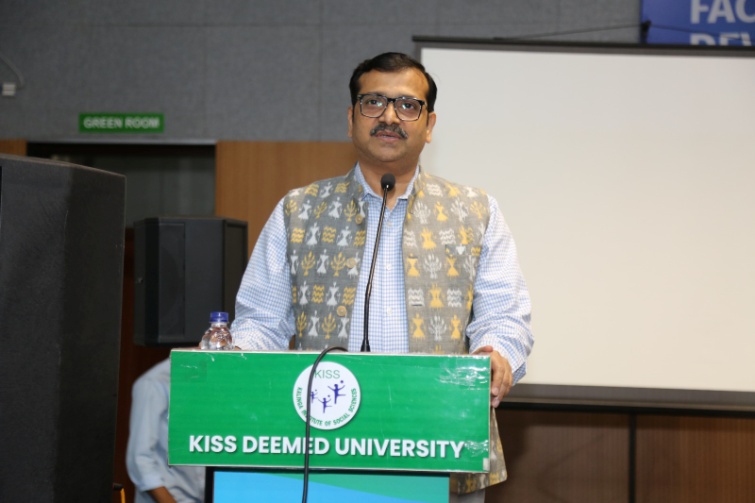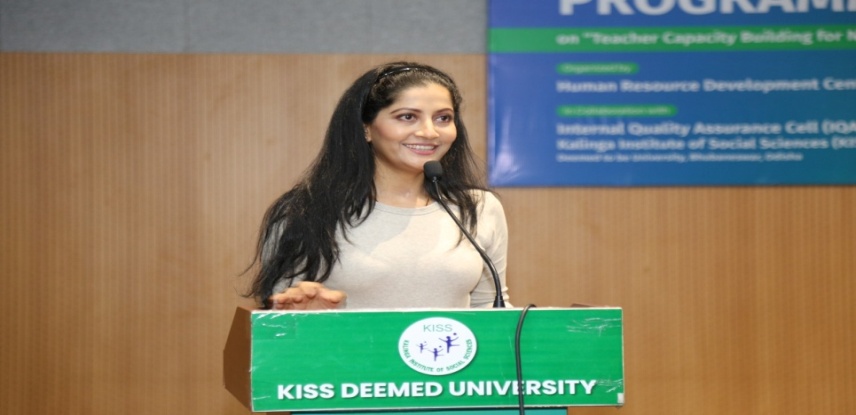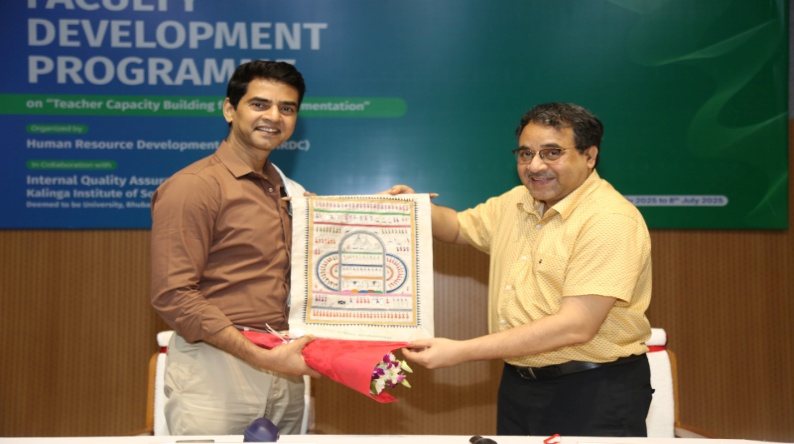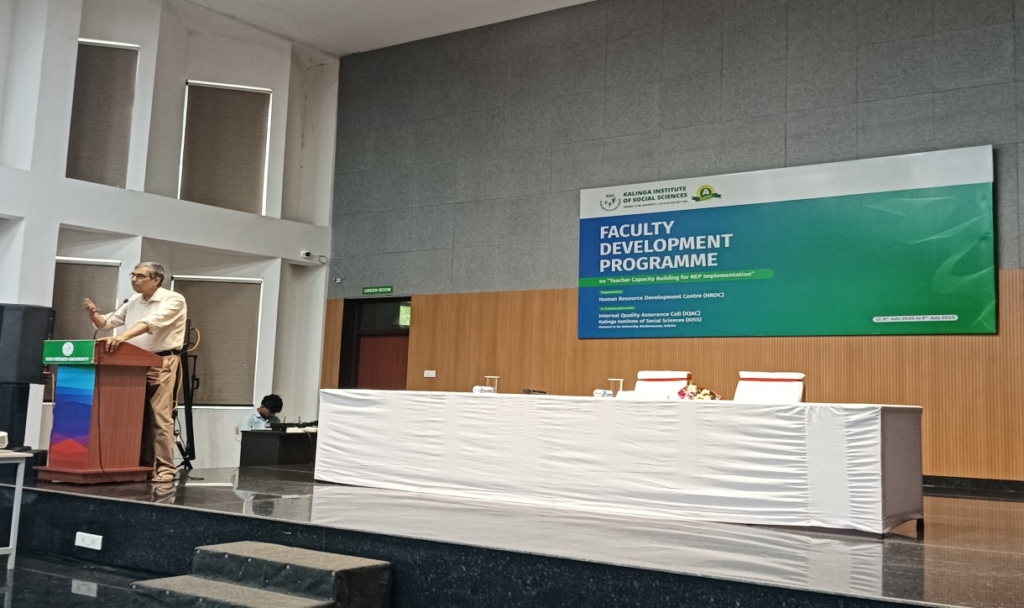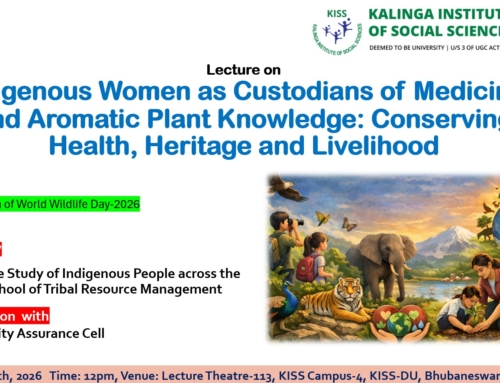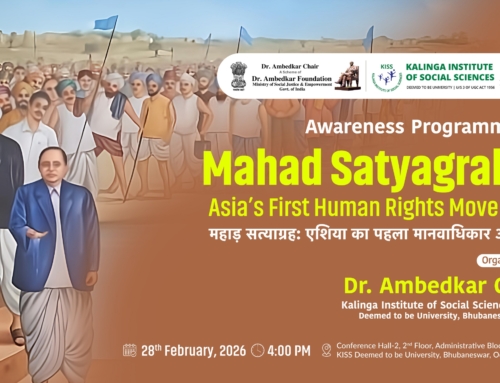A week-long Faculty Development Programme on “Teacher Capacity Building for NEP Implementation” was inaugurated on 2nd July 2025 at KISS Deemed to be University. The programme was organized by the Human Resource Development Centre (HRDC), KISS-DU and brought together a group of educators of KISS-DU committed to enhancing academic excellence in line with the National Education Policy (NEP) 2020.
The Inaugural Session was graced by the esteemed presence of Professor Saranjit Singh, Hon’ble Vice Chancellor, KIIT Deemed to be University who attended as the Chief Guest. In his address, Professor Singh highlighted the transformative vision of NEP 2020 and emphasized the need for continuous professional development to enable teachers to meet the demands of a multidisciplinary and student-centric education system. He underlined the role of innovation, digital literacy, and value-based education in redefining teaching practices for the 21st century.
Professor Debashis Bandyopadhyay, Hon’ble Vice Chancellor, KISS-DU, delivered the Welcome Address, in which he stressed the critical importance of faculty readiness for implementing NEP effectively. He encouraged the faculty to engage meaningfully with the sessions and adopt NEP-aligned pedagogical approaches, curriculum frameworks, and assessment models. Professor Bandyopadhyay also reaffirmed the university’s commitment to inclusive and quality education for all, especially for tribal students.
The session was attended by Dr. Prashanta Kumar Routray, Registrar KISS-DU, Deans, Directors, Heads of Centres, and faculty members from across the university all of whom pledged their support and active participation in the FDP. Their presence added to the intellectual vibrancy and collective resolve to align institutional practices with national educational goals.
The inaugural event set a tone of enthusiasm and commitment, laying the foundation for a successful and enriching week of academic engagement and professional growth.
At the end of the session, Dr. Chittaranjan Bhoi, Director, HRDC offered word of thanks to the Guests and dignitaries and all the participants of the FDP.
Prof. Debashis Bandyopadhyay, Vice Chancellor of KISS-DU, in his insightful address on Multidisciplinary Integral Capacity Building and NEP 2020 during the Faculty Development Programme emphasized the transformative vision of NEP 2020. He highlighted the need for breaking disciplinary silos and fostering holistic education that blends science, humanities, and indigenous knowledge systems. Stressing faculty as key agents of change, he advocated for innovative pedagogies, research orientation, and community engagement. Professor Bandyopadhyay underscored KISS-DU’s unique position in integrating tribal wisdom with contemporary learning, thus setting a model for inclusive, equitable, and multidisciplinary education aligned with national goals.
Prof. Jatin Nayak, Professor Emeritus, KISS-DU in his insightful talk on “Designing Multidisciplinary and Holistic Education Programs”, Professor Jatin Nayak, Professor Emeritus at KISS Deemed to be University, shed light on one of the foundational pillars of the National Education Policy (NEP) 2020. Emphasizing the need to break down rigid disciplinary boundaries, he advocated for educational frameworks that promote interconnected learning, creative inquiry, and critical thinking. He underlined that true education must engage the head, heart, and hand — combining cognitive skills, emotional intelligence, and practical abilities.
Professor Nayak stressed that multidisciplinary education must not merely offer a bouquet of unrelated subjects, but should be woven around a meaningful curriculum that encourages students to understand real-world complexities. He drew attention to the role of Indian knowledge systems, indigenous perspectives, and cultural literacy in shaping holistic learning models. Furthermore, he highlighted how integrating science, humanities, and vocational knowledge can better prepare students for evolving global challenges and dynamic career paths.
His talk inspired the participants to rethink curriculum design, pedagogy, and institutional collaboration with a focus on learner-centric and context-sensitive approaches.
Prof. Deepak Kumar Behera, Former Vice Chancellor, KISS-DU In his engaging talk on “Role of Faculty as Mentors and Facilitators in Student Learning”, Professor Deepak Kumar Behera, Former Vice Chancellor of KISS Deemed to be University, emphasized the evolving role of faculty in the 21st-century learning ecosystem. Moving beyond traditional notions of teachers as mere transmitters of knowledge, he highlighted the importance of faculty members serving as mentors, guides, and co-learners in the academic journey of students. He argued that effective mentoring not only supports academic development but also nurtures personal growth, self-awareness, and a lifelong love for learning.
Professor Behera particularly underscored the relevance of Autoethnography as a reflective tool in faculty development and pedagogy. He described it as a powerful method through which educators can critically examine their own teaching experiences, cultural positioning, and impact on student engagement. By encouraging faculty to introspect and articulate their educational practices through narrative and self-reflection, autoethnography bridges personal insight with professional growth.
His session inspired the FDP participants to cultivate empathy, practice active listening, and create inclusive learning spaces. He called for a shift from authoritative teaching to participatory facilitation, where students are encouraged to explore, question, and co-construct knowledge alongside their mentors.
The Faculty Development Programme (FDP) at KISS DU on 9th July 2025 witnessed a significant and thought-provoking session with the esteemed presence of two prominent film celebrities, Mr. Sukanta Rath and Ms. Anu Choudhury. Both the luminaries from the Odia film industry delivered insightful talks on the theme, Relevance of Introducing Performing Art Programme in Universities.
The session began with a warm welcome extended by the convenor of the FDP, followed by brief introductions of the distinguished guests.
Professor Atanu Kumar Pati, Professor Emeritus, KISS Deemed to be University, delivered an inspiring and scholarly talk on “Research, Innovation and Community Engagement in the NEP Framework” during the Faculty Development Programme held on 6th July 2025 at KISS DU.
In his address, Prof. Pati emphasized that the National Education Policy (NEP) 2020 marks a paradigm shift in the Indian higher education system by embedding research, innovation, and community engagement as foundational pillars of knowledge creation and nation-building. He urged faculty members to move beyond the conventional boundaries of teaching and embrace a more dynamic, outcome-driven approach to academics that connects education with real-world challenges.
Highlighting research, Prof. Pati called for a culture of inquiry, exploration, and evidence-based problem-solving across all disciplines. He pointed out that under the NEP, research should not be limited to elite academic circles but democratized and made relevant to local and national needs. He also encouraged interdisciplinary research and collaboration with industry, civil society, and international institutions.
Regarding innovation, Professor Pati encouraged faculty members to foster creativity and critical thinking among students. He stated that universities must function as hubs of innovation by supporting start-ups, social enterprises, and solution-oriented projects, particularly those that address local socio-economic issues. Innovation, he said, is not only about technology but also about rethinking pedagogy, institutional practices, and engagement strategies.
On community engagement, Professor Pati emphasized that universities must serve as catalysts for social transformation. He lauded KISS-DU for its unique integration of education with social impact and highlighted how the NEP advocates for institutions to build strong ties with local communities. He recommended incorporating service-learning, participatory research, and field-based learning into academic programmes, thereby bridging the gap between knowledge and grassroots realities.
Professor Pati concluded by calling for a mindset change among educators—from being transmitters of information to becoming facilitators of meaningful, socially relevant knowledge. He underscored that the success of NEP depends largely on how effectively institutions internalize these core values and reorient their structures accordingly.
His talk was well received by the participants, sparking an engaging discussion on how faculty members can align their work with the NEP goals while contributing to both academic excellence and societal development.
The session served as a motivational and practical guide for faculty members to align their academic pursuits with the transformative aspirations of the NEP 2020.
Dr. Hrushikesh Senapaty, Former Director of the National Council of Educational Research and Training (NCERT), delivered an illuminating talk on “Competency-Based Curriculum Development and Outcome-Based Education (OBE)” during the Faculty Development Programme at KISS Deemed to be University. Drawing from his extensive experience in educational policy and curriculum design, Dr. Senapaty emphasized the urgent need to shift from content-heavy syllabi to a learner-centric, skill-driven framework that focuses on measurable outcomes.
He elaborated on how Competency-Based Education (CBE) ensures the holistic development of learners by targeting specific knowledge, skills, values and attitudes aligned with real-life applications. He explained that Outcome-Based Education (OBE) works in tandem with CBE by clearly defining learning outcomes at every level of education and ensuring that teaching strategies, assessments and curriculum planning are aligned with those outcomes.
Dr. Debasis Das, Director of the Institute of Life Sciences (ILS), Bhubaneswar, delivered an insightful talk on the theme “Understanding India’s Blue Economy: Road Ahead” during the Faculty Development Programme at KISS Deemed to be University. In his address, Dr. Das highlighted the immense potential of India’s Blue Economy — the sustainable use of ocean resources for economic growth, improved livelihoods, and ecosystem health.
He elaborated on the strategic importance of India’s vast coastline, rich marine biodiversity, and exclusive economic zones that provide significant opportunities for fisheries, aquaculture, deep-sea mining, marine biotechnology, coastal tourism, and renewable energy. Dr. Das emphasized the need for an integrated ocean management policy, robust scientific research, and community engagement to harness these resources responsibly.
Focusing on innovation and sustainability, he also spoke about the role of cutting-edge technologies like satellite mapping, marine genomics, and biotechnology in transforming marine resource utilization. Stressing inter-sectoral collaboration between institutions, industries, and indigenous coastal communities, Dr. Das called for aligning India’s developmental goals with ecological stewardship. His talk provided a comprehensive vision for the road ahead, urging academia to contribute through research, policy inputs, and capacity building for a sustainable and inclusive Blue Economy.
Mr. Sukanta Rath, a veteran actor and cultural advocate, highlighted the historical and cultural significance of performing arts in India. He underscored how performing arts—be it theatre, dance, or music—play a crucial role in shaping societal values, emotional intelligence, and creative expression. He strongly advocated for the integration of performing arts into higher education curricula, citing that such programs foster holistic development among students and help in building self-confidence, discipline, and cultural consciousness.
Ms. Anu Choudhury, a celebrated actress and social activist, emphasized the transformative power of performing arts in promoting mental well-being and social harmony. She argued that in the age of digital distractions and academic stress, performing arts offer students a therapeutic and expressive outlet. She also pointed out that structured training in performing arts can open up alternative career paths and entrepreneurship opportunities in the creative industries. Ms. Choudhury urged educational institutions to create inclusive spaces where students from all backgrounds can access and engage with diverse art forms.
The interaction session saw enthusiastic participation from faculty members, who raised pertinent questions about curriculum design, resource allocation, and interdisciplinary collaborations. Both speakers responded thoughtfully, encouraging educators to explore partnerships with local artists, cultural institutions, and digital platforms to make performing arts more accessible and dynamic.
The session concluded with a formal vote of thanks by the Dean, School of Performing Arts, acknowledging the valuable contributions of Mr. Rath and Ms. Choudhury. Their presence added immense value to the FDP and sparked a deeper interest in advocating for performing arts education within academic spaces.
The session was not only enlightening but also inspirational, leaving a lasting impact on all attendees.
At the end of the session, Dr. Chittaranjan Bhoi, Director HRDC extended Vote of Thanks expressing gratitude to all the dignitaries, participants and organizing members. He appreciated the insightful deliberations and reiterated the importance of collaborative effort in realizing the objectives of NEP 2020.

